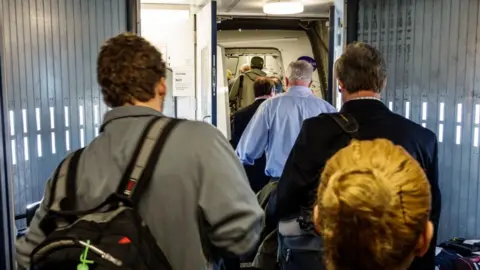Air fares face turbulence when flights slowly restart
 Getty Images
Getty ImagesAir fares should fall when flights restart but then rise by at least 50%, warns a global airline industry body.
Airlines are keen to get planes back in the skies quickly which could lead to over-capacity, says the International Air Transport Association (Iata).
With passenger demand likely to remain low this should put pressure on carriers to reduce the cost of flights.
But if airlines are forced to keep middle seats free they will need to raise air fares significantly.
Under current social distancing proposals, airlines may be required to keep middle seats free which would have a major impact on their profitability, as they would be forced to fly with fewer passengers. Michael O'Leary, the boss of Ryanair, said keeping middle seats empty was "idiotic".
Iata estimates that only four of the 122 airlines it sampled would be able to break even under these conditions, leading to consolidation in the industry. Raising fares is "inevitable" for carriers to remain commercially viable.
Most airlines are already struggling with the severe downturn in passenger numbers with the vast majority of their planes grounded.
On Tuesday, Virgin Atlantic said it would cut more than 3,000 jobs and end its operations at Gatwick Airport. Last month, Virgin Australia went into voluntary administration and analysts fear other airlines will follow.
"It's tricky to understand how many airlines will be able to operate profitably. It will be a much smaller industry," said Brian Pearce, Iata's chief economist, talking about the onboard social distancing proposals.
His team argues that social distancing through vacant middle seats is no guarantee against the spread of coronavirus on planes. Instead, Iata supports the wearing of face masks by passengers for safer flying.
The ray of hope for passengers is that they could see cheaper fares once flights resume as carriers attempt to stimulate demand.
Airlines will only be able to increase air fares once passenger numbers recover, but this will only be by 2021 at the earliest, estimates Iata.
